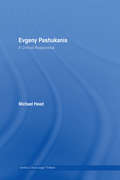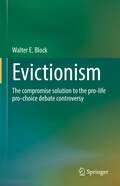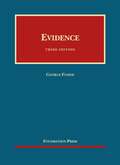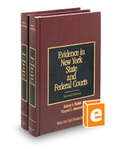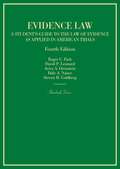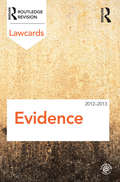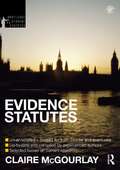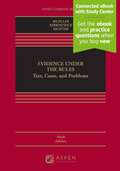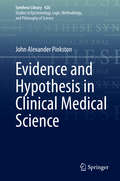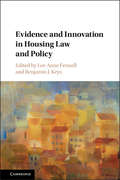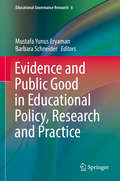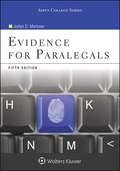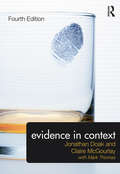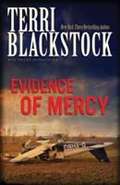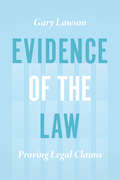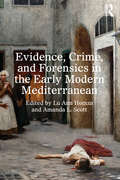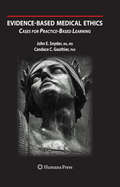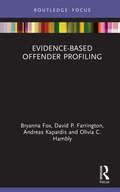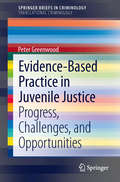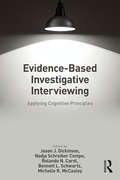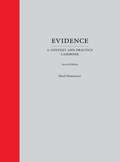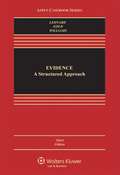- Table View
- List View
Evgeny Pashukanis: A Critical Reappraisal (Nomikoi: Critical Legal Thinkers)
by Michael HeadA thorough examination of Pashukanis’ writings, this book is a significant contribution to a proper assessment of Pashukanis’ work, the value of his theoretical legacy and the contemporary relevance of Marxist legal theory. Interest in the best-known Soviet legal scholar, Evgeny Pashukanis, remains widespread and his work retains considerable relevance. His writings provide a rich source of material on the Marxist theory of law and the state, as well as the attempts to apply that doctrine in Soviet Russia. In this book, Michael Head considers Pashukanis’ work both within its historical context and in relation to contemporary legal theory, answering a range of questions including: How and why did Pashukanis emerge as the pre-eminent Soviet jurist from 1924 to 1930? Why did he come under only minor criticism from 1930 to 1936 and then be denounced and executed in 1937 as a 'Trotskyite saboteur'? Why have many Western scholars generally praised the quality and originality of Pashukanis’ work, yet also drawn the conclusion that his fate illustrates the intrinsic impossibility of the entire communist project? Serving as an introduction to Pashukanis and Marxist legal theory and a timely contribution in light of the universal assault on civil liberties in the indefinite 'War on Terror' and the constant escalation of 'law and order' measures in Western societies, this volume is an invaluable resource for those interested in jurisprudence and critical thought.
Evicitionism: The compromise solution to the pro-life pro-choice debate controversy
by Walter E. BlockThis book applies libertarian property rights theory to a vexing controversy, abortion. This book offers a compromise solution that will not fully please either of the two sides of this debate, but, is the only possible reconciliation between the two. Nor are its benefits limited to the fact that the opposing forces in this debate may be brought together. Evictionism, also, is the only philosophical position compatible with human rights; neither of the other two can make this claim.There are many other publications and learned articles supporting the pro-life position as well as defending the pro-life viewpoint. This is the only book that offers a perspective on abortion that is radically different than both. This book uniquely applies private property rights theories we all agree upon when referred to issues such as real estate, crime, torts, etc., to abortion. The underlying philosophical contribution of Evictionism this book presents is that these basic legal premises can be utilized in this controversial case as well as practically everywhere else in law.Want to solve the abortion controversy? Want to demonstrate that both the pro-life and the pro-choice positions are erroneous? Want to read about a position that is a compromise between the pro-life and the pro-choice positions? Then this book provides robust understanding, discussions and applications for getting to the truth about this issue.
Evidence In New York State And Federal Courts (New York Practice Series #Second Edition, Volume 5)
by Robert A. Barker Vincent C. AlexanderEVIDENCE IN NEW YORK STATE AND FEDERAL COURTS SECOND EDITION Volume 5
Evidence In New York State And Federal Courts 2d (New York Practice Series #Volume 5A)
by Robert A. Barker Vincent C. AlexanderThis comprehensive publication on the law of evidence in New York includes a summary of corresponding law under the Federal Rules of Evidence (FRE). The authors synthesize and explain the complex mix of cases and statutes, while examining the purpose and requirements of the rules, together with discussion of leading cases. The title also includes New York's evidence statutes and the relevant FRE in their restyled format. Chapters cover general principles, judicial notice, burden of proof and presumptions, relevancy, privileges, witnesses, opinions and expert testimony, hearsay, authentication and identification, best evidence, and real and demonstrative evidence.
Evidence Law: A Student's Guide to the Law of Evidence as Applied in American Trials (Hornbooks)
by Steven Goldberg David Leonard Roger Park Aviva Orenstein Dale NanceIn clear and engaging prose that makes concepts accessible without oversimplification, this Treatise explains the Federal Rules, selected state variations, major cases, essential doctrines, and important underlying policies. Frequent practical examples drawn from courtroom practice introduce students to courtroom procedure, provide a context in which evidence problems arise, and acquaint them with the language of the courtroom. This volume can serve as background for beginning students and as a one-stop refresher for those taking advanced courses. Professors can assign various sections to track the syllabus or simply recommend this book as useful background reading.
Evidence Lawcards 2012-2013 (Lawcards)
by RoutledgeRoutledge Lawcards are your complete, pocket-sized guides to key examinable areas of the undergraduate law curriculum and the CPE/GDL. Their concise text, user-friendly layout and compact format make them an ideal revision aid. Helping you to identify, understand and commit to memory the salient points of each area of the law, shouldn’t you make Routledge Lawcards your essential revision companions? Fully updated and revised with all the most important recent legal developments, Routledge Lawcards are packed with features: Revision checklists help you to consolidate the key issues within each topic Colour coded highlighting really makes cases and legislation stand out Full tables of cases and legislation make for easy reference Boxed case notes pick out the cases that are most likely to come up in exams Diagrams and flowcharts clarify and condense complex and important topics '...an excellent starting point for any enthusiastic reviser. The books are concise and get right down to the nitty-gritty of each topic.' - Lex Magazine Routledge Lawcards are supported by a Companion Website offering: Flashcard glossaries allowing you to test your understanding of key terms and definitions Multiple Choice Questions to test and consolidate your revision of each chapter Advice and tips to help you better plan your revision and prepare for your exams Titles in the Series: Commercial Law; Company Law; Constitutional Law; Contract Law; Criminal Law; Employment Law; English Legal System; European Union Law; Evidence; Equity and Trusts; Family Law; Human Rights; Intellectual Property Law; Jurisprudence; Land Law; Tort Law
Evidence Matters
by Susan HaackIs truth in the law just plain truth - or something sui generis? Is a trial a search for truth? Do adversarial procedures and exclusionary rules of evidence enable, or impede, the accurate determination of factual issues? Can degrees of proof be identified with mathematical probabilities? What role can statistical evidence properly play? How can courts best handle the scientific testimony on which cases sometimes turn? How are they to distinguish reliable scientific testimony from unreliable hokum? These interdisciplinary essays explore such questions about science, proof, and truth in the law. With her characteristic clarity and verve, Haack brings her original and distinctive work in theory of knowledge and philosophy of science to bear on real-life legal issues. She includes detailed analyses of a wide variety of cases and lucid summaries of relevant scientific work, of the many roles of the scientific peer-review system, and of relevant legal developments.
Evidence Statutes 2012-2013 (Routledge Student Statutes)
by Claire McGourlay‘Focused content, layout and price - Routledge competes and wins in relation to all of these factors’ - Craig Lind, University of Sussex, UK ‘The best value and best format books on the market.’ - Ed Bates, Southampton University, UK Routledge Student Statutes present all the legislation students need in one easy-to-use volume. Developed in response to feedback from lecturers and students, this book offer a fully up-to-date, comprehensive, and clearly presented collection of legislation - ideal for LLB and GDL course and exam use. Routledge Student Statutes are: • Exam Friendly: un-annotated and conforming to exam regulations • Tailored to fit your course: 80% of lecturers we surveyed agree that Routledge Student Statutes match their course and cover the relevant legislation • Trustworthy: Routledge Student Statutes are compiled by subject experts, updated annually and have been developed to meet student needs through extensive market research • Easy to use: a clear text design, comprehensive table of contents, multiple indexes and highlighted amendments to the law make these books the most student-friendly Statutes on the market Competitively Priced: Routledge Student Statutes offer content and usability rated as good or better than our major competitor, but at a more competitive price • Supported by a Companion Website: presenting scenario questions for interpreting Statutes, annotated web links, and multiple-choice questions, these resources are designed to help students to be confident and prepared.
Evidence Under The Rules: Text, Cases, And Problems (Aspen Casebook Ser.)
by Christopher B. Mueller Laird C. Kirkpatrick Liesa RichterEvidence Under the Rules: Text, Cases, and Problems is one of the most widely-adopted Evidence casebooks ever published. Structured around the Federal Rules of Evidence, the book contains carefully edited cases and secondary materials, as well as numerous problems that allow students to apply concepts during classroom exercises or on their own. Text boxes provide interesting background on select cases and additional perspectives on key issues. The Ninth Edition has been updated to include the most recent Evidence cases and developments, as well as insights into recent and pending amendments to the Federal Rules. It has been streamlined by shortening or eliminating some notes, making it even more user-friendly. It contains applications of evidence law to factual scenarios that students are likely to find particularly interesting.
Evidence and Hypothesis in Clinical Medical Science (Synthese Library #426)
by John Alexander PinkstonIn this book, the author argues that no current philosophical theory of evidence in clinical medical science is adequate. None can accurately explain the way evidence is gathered and used to confirm hypotheses. To correct this, he proposes a new approach called the weight of evidence account. This innovative method supplies a satisfactory explanation and rationale for the “hierarchical pyramid” of evidence–based medicine, with randomized clinical trials and their derivatives, meta-analyses, and systematic reviews of randomized clinical trials at the top and case reports, case series, expert opinion, and the like at the bottom. The author illustrates the development of various “levels” of evidence by considering the evolution of less invasive surgical treatments for early breast cancer. He shows that the weight of evidence account explains the notion of levels of evidence and other efforts to rank them. In addition, he presents a defense of randomization as a method to maximize accuracy in the conduct of clinical trials. The title also considers ethical issues surrounding experimentation with medical therapies in human subjects. It illustrates and discusses these issues in studies of respiratory therapies in neonates and treatment for certain cancers in adults. The author shows that in many cases sufficient evidence can be accrued to warrant generally accepted new therapies without the need for evidence derived from randomized clinical trials.
Evidence and Innovation in Housing Law and Policy
by Benjamin J. Fennell Lee Anne KeysNo area of law and policy is more central to our well-being than housing, yet research on the topic is too often produced in disciplinary or methodological silos that fail to connect to policy on the ground. This pathbreaking book, which features leading scholars from a range of academic fields, cuts across disciplines to forge new connections in the discourse. In accessible prose filled with cutting-edge ideas, these scholars address topics ranging from the recent financial crisis to discrimination and gentrification and show how housing law and policy impacts household wealth, financial markets, urban landscapes, and local communities. Together, they harness evidence and theory to capture the 'state of play' in housing, generating insights that will be relevant to academics and policymakers alike. This title is also available as Open Access.
Evidence and Public Good in Educational Policy, Research and Practice
by Barbara Schneider Mustafa Yunus EryamanThis volume draws together interdisciplinary approaches from political philosophy, social work, medicine and sociology to analyze the theoretical foundations and practical examples of evidence-based and evidence-informed education for the public good. It presents a range of conceptions of the evidence-based and evidence-informed education and a justification for why the particular examples or issues chosen fit within that conception for the sake of public good. It explores the current literature on evidence-based and evidence-informed educational policy, research and practice, and introduces a new term, 'evidence free', meaning actions of some policymakers who disregard or misuse evidence for their own agenda. The demands about the quality and relevance of educational research to inform the policy and practice have been growing over the past decade in response to the Evidence-Based Education movement. However the literature is yet to tackle the question of the interrelationships between evidence, research, policy and practice in education for the public good in an international context. This book fills that gap.
Evidence and the Archive: Ethics, Aesthetics and Emotion
by Trish Luker Katherine BiberThis collection explores the stakes, risks and opportunities invoked in opening and exploring law’s archive and re-examining law’s evidence. It draws together work exploring how evidence is used or mis-used during the legal process, and re-used after the law’s work has concluded by engaging with ethical, aesthetic or emotional dimensions of using law’s evidence. Within socio-legal discourse, the move towards ‘open justice’ has emerged concurrently with a much broader cultural sensibility, one that has been called the "archival turn" (Ann Laura Stoler), the "archival impulse" (Hal Foster) and "archive fever" (Jacques Derrida). Whilst these terms do not describe exactly the same phenomena, they collectively acknowledge the process by which we create a fetish of the stored document. The archive facilitates our material confrontation with history, historicity, order, linearity, time and bureaucracy. For lawyers, artists, journalists, publishers, curators and scholars, the document in the archive has the attributes of authenticity, contemporaneity, and the unique tangibility of a real moment captured in material form. These attributes form the basis for the strict interpretive limits imposed by the rules of evidence and procedure. These rules do not contain the other attributes of the archival document, those that make it irresistible as the basis for creative work: beauty, violence, surprise, shame, volume, and the promise that it contains a tantalising secret. This book was previously published as a special issue of Australian Feminist Law Journal.
Evidence for Paralegals (Aspen College Series)
by Joelyn D. MarloweCovers topics, including gathering evidence, interviewing witnesses, and researching. Written from a real-life perspective, showing how actual practice works in local, state, and federal court. Pedagogy in text developed for paralegal students, and includes short case summaries, readable examples, marginal definitions of terms, marginal cross-references to the Rules of Evidence, review questions, and hypotheticals. Short, concise presentation is ideal for paralegal courses. Updated with changes to the Federal Rules of Evidence and with new cases.
Evidence in Context
by Mark Thomas Jonathan Doak Claire McGourlayEvidence in Context explains the key concepts of evidence law in England and Wales clearly and concisely, set against the backdrop of the broader political and theoretical contexts. The book helps to inform students of the major debates within the field, providing an explanation as to how and why the law has developed as it has. This fourth edition has been revised and expanded to include developments in the law of hearsay evidence as well as recent litigation surrounding witness anonymity orders, bad character and vulnerable witnesses. It also addresses the on-going controversy and debate about the use of expert witnesses. A brand new chapter considers the contentious issue of public interest immunity, and the introductory chapter has been substantially expanded to consider the?continuing interplay between the UK courts and the European Court of Human Rights as the role of human rights in evidence becomes increasingly important. Features include: Key learning points to summarise the major principles of evidence law Practical examples to help students understand how the rules are applied in practice Self-test questions to encourage students to reflect on what they have learned A supporting companion website including answers to self-test questions Well-written, clear and with a logical structure throughout, Evidence in Context contains all the information necessary for any undergraduate evidence law module.
Evidence of Mercy (Sun Coast Chronicles #1)
by Terri BlackstockTake a fast-paced flight into suspense, romance, and forgiveness! When Lynda Barrett's plane malfunctions, the crash landing injures its prospective buyer, Jake. An investigation reveals that someone tampered with her plane---and it soon becomes clear that whoever it was has further murderous designs on Lynda.
Evidence of the Law: Proving Legal Claims
by Gary LawsonHow does one prove the law? If your neighbor breaks your window, the law regulates how you can show your claim to be true or false; but how do you prove that in breaking your window your neighbor has broken the law? American jurisprudence devotes an elaborate body of doctrine—and an equally elaborate body of accompanying scholarly commentary—to worrying about how to prove facts. It establishes rules for the admissibility of evidence, creates varying standards of proof, and assigns burdens of proof that determine who wins or loses when the facts are unclear. But the law is shockingly inexplicit when addressing these issues with respect to the proof of legal claims. Indeed, the entire language of evidentiary proof, so sophisticated when it comes to questions of fact, is largely absent from the American legal system with respect to questions of law. As Gary Lawson shows, legal claims are inherently objects of proof, and whether or not the law acknowledges the point openly, proof of legal claims is just a special case of the more general norms governing proof of any claim. As a result, similar principles of evidentiary admissibility, standards of proof, and burdens of proof operate, and must operate, in the background of claims about the law. This book brings these evidentiary principles for proving law out of the shadows so that they can be analyzed, clarified, and discussed. Viewing legal problems through this lens of proof illuminates debates about everything from constitutional interpretation to the role of stipulations in litigation. Rather than prescribe resolutions to any of those debates, Evidence of the Law instead provides a set of tools that can be used to make those debates more fruitful, whatever one’s substantive views may be. As lawyers, judges, and legal subjects confront uncertainty about what the law is, they can, should, and must, Lawson argues, be guided by the same kinds of abstract considerations, structures, and doctrines long used to make determinations about questions of fact.
Evidence, Crime, and Forensics in the Early Modern Mediterranean
by Lu Ann Homza Amanda L. ScottRecent historians have pinpointed the ways in which legal systems in early modern Europe were improvisational, flexible, and contingent rather than immovable, hierarchical, and gendered. Evidence, Crime, and Forensics in the Early Modern Mediterranean amplifies such findings by looking at law and its consumers in the Mediterranean, broadly imagined, between 1500 and 1750. The volume’s essays enhance our awareness of how crimes were defined, evidence was offered, and forensic awareness appeared in secular, inquisitorial, and specially commissioned courts in Spain, Italy, and the Hapsburg Balkans.This collection threads an important needle: our authors recognize formal chains of command and legal commonplaces but nonetheless emphasize how such factors could be challenged, manipulated, or ignored by illiterate and vulnerable populations. It turns out that ordinary individuals in the early modern Mediterranean did not find themselves limited in their legal options, and their degree of sophistication in court speaks volumes about networks of legal knowledge. Furthermore, in no way does the use of the courts between 1500 and 1750 imply more “rational” ways of seeking justice, since emotions were always firmly on display, even if rage and regret were being deployed for performative reasons.Evidence, Crime, and Forensics in the Early Modern Mediterranean illustrates the range of questions we can put to archival sources from the early modern Mediterranean, with plentiful insights as to how legal sources can illuminate history from below. This collection will be a welcome addition for undergraduate and graduate courses on European history, as well as a provocative resource for more general audiences.
Evidence-Based Medical Ethics:
by Rosemarie Tong John E. Snyder Candace C. GauthierIn the modern practice of medicine, new challenges complicate the ethical care of patients. Today's times require a contemporary take on the concept of medical ethics. The idea for this textbook was born out of a need for a teaching resource that merges medical ethics theory with the practical needs of modern clinical medicine. In Evidence-Based Medical Ethics: Cases for Practice-Based Learning, the authors address what has been missing in existing text books and ethics courses to date - clear-cut ethical and legal guidelines that provide a method for the reader to learn how to systematically manage dilemmas seen in the everyday practice of medicine. The reader is guided through several "typical" patient scenarios and prompted by various questions that should be entertained by the treating health care provider. Then, relevant evidence-based medicine, legal precedent, and the ethical theory that applies to the situation are revealed. Often, finding the "best" ethical solution for each problem is automatic, as the solution often becomes self-evident during information-gathering. This general method is reinforced throughout the text with multiple different cases, using a practice-based approach by building on the reader's developing skills. Additionally, we have sought to emphasize a culturally competent manner in resolving these dilemmas, respectfully addressing issues of age, gender, and culture whenever possible. The main goal of Evidence-Based Medical Ethics: Cases for Practice-Bases Learning is to assist the reader in adapting a patient-centered and evidence-based approach to dilemmas faced in their future practice of medicine.
Evidence-Based Offender Profiling (Criminology in Focus)
by David P. Farrington Andreas Kapardis Bryanna Fox Olivia C. HamblyOffender profiling is an investigative tool used to narrow down the range of potential suspects for a crime by predicting the personality, behavioral, and demographic characteristics that an offender is likely to possess, based upon information collected at the crime scene. While offender profiling has been popularized by TV shows and movies such as Criminal Minds, Silence of the Lambs, and Mindhunter, the real-world impact of offender profiling is largely unknown. This book discusses the history of offender profiling, summarizes research on offender profiling methods, and reviews offender profiling evaluations of accuracy and applied impact. This book also describes a promising new offender profiling methodology called evidence-based offender profiling. This new method relies upon empirical data and scientific methods to develop, evaluate, and replicate offender profiles, thereby increasing offender profiling’s accuracy and utility for active police investigations. It uses prior information about statistical regularities between types of offenders and types of offenses to predict the characteristics of offenders in unsolved cases. A discussion of the future of offender profiling research and implications for law enforcement is also included. This book also explains how practitioners can benefit from the use of empirically tested and validated profiles in their unsolved investigations and how the use, continued research, and evaluation of evidence-based offender profiling can advance the quality, prestige, and utility of the field of offender profiling.
Evidence-Based Practice in Juvenile Justice
by Peter GreenwoodOver the past 15 years, evidence-based practice in juvenile justice has moved from a concept to a full blown practice in a number of states. They have used research based principles and programs to: - completely reorganize their system for treating juveniles -reduce crime and recidivism -and saved money in the process. Evidence-Based Practice in Juvenile Justice describes the major players in this transformative process, the particular role they play in moving research to practice, and provides recommendations for applying this research in other locations. It will be of key interest to researchers in Criminology and Criminal Justice with a focus on Juvenile Justice or Juvenile Delinquency, or related fields such as Public Policy and Social Work, as well as policy-makers, and practitioners working in the juvenile justice system.
Evidence-based Investigative Interviewing: Applying Cognitive Principles
by Bennett L. Schwartz Jason J. Dickinson Nadja Schreiber Compo Rolando Carol Michelle McCauleyFor as long as we have been researching human memory, psychologists have been investigating how people remember and forget. This research is regularly drawn upon in our legal systems. Historically, we have relied upon eyewitness memory to help judge responsibility and adjudicate truth, but memory is malleable, prone to error, and susceptible to bias. Even confident eyewitnesses make mistakes, and even accurate witnesses sometimes find their testimony subjected to harsh scrutiny. Emerging from this environment, the Cognitive Interview (CI) became a means of assisting cooperative witnesses with recalling more information without sacrificing accuracy. First used by police interviewing adult witnesses, it is now used with many populations in many contexts, including public health, accident reconstruction, and the interrogation of terror suspects. Evidence-Based Investigative Interviewing reviews the application of cognitive research to investigative interviewing, revealing how principles of cognition, memory, and social dynamics may increase the accuracy of eyewitness testimony. It provides evidence-based applications for investigators beyond the forensic domain in areas such as eyewitness identification, detecting deception, and interviewing children. Drawing together the work of thirty-three authors across both the academic and practice communities, this comprehensive collection is essential reading for researchers in psychology, forensics, and disciplines such as epidemiology and gerontology.
Evidence: A Context and Practice Casebook
by Pavel Wonsowicz<p>This casebook is designed to engage students with a wide range of learning styles and to explore evidence law from the eyes of an advocate. Through a problem-centered approach that focuses on the gray areas of the Federal Rules of Evidence, students will develop a heightened sensitivity to factual and legal arguments that govern the admissibility of evidence. This focus on legal argumentation allows students to actively cultivate an understanding of the legal doctrine behind the Federal Rules of Evidence as well as the role that facts and narrative play in legal reasoning. Exercises, visual aids, and video supplements in each chapter allow students to assess their learning. <p>A single thread that runs through the book is video and case materials surrounding a North Carolina murder trial, State v. Peterson. The trial was memorialized in an award-winning documentary, The Staircase, directed by Jean-Xavier de Lestrade. The casebook follows the trial, including the strategies undertaken by counsel and the battles over evidentiary issues that shaped both sides narratives in the trial. Video excerpts will be provided to the instructor to add a further dimension to student learning and to reach a broad array of learning styles. <p>The new second edition has incorporated pedagogical innovations (including new flowcharts to enhance understanding), updated the law based on amendments to the Federal Rules of Evidence and recent Supreme Court cases, and developed new problems to explore the nuances in the law. The second edition is designed to make it easy for professors to incorporate best practices into their classes in order to train students to be self-directed, successful learners.</p>
Evidence: A Structured Approach
by David P. Leonard Victor J. Gold Gary C. WilliamsEvidence: A Structured Approach is designed to facilitate teaching andlearning. Its unique organization complements the way most professors teachevidence law, with each section focused on one Federal Rule of Evidence. Questions are presented as a series of short, accessible hypotheticals andbuild upon one another to facilitate thorough student understanding of therule at hand. Students know in advance what questions will be the focus ofclassroom discussion, providing a strong incentive to come to class prepared. The authors emphasize the written rules, rather than case law, as the primarysource of evidence law today. Salient cases are skillfully edited to providesolid legal grounding in the topic, and author-written explanatory materialand notes help bring the rules of evidence to life. The Third Edition welcomes new co-author Gary Williams, anexpert in the rules of evidence. New Supreme Court cases, with questions forclassroom discussion, and new FRE amendments are also included in thisedition. The impact of new technology on evidence law issues is exploredthrough cases and problems, and the Teacher's Manual has been updated toreflect new and expanded material. Features:The structured approach complements the way that most professors teachevidence law:One Federal Rule of Evidence introduces each section, followed bytext-including numerous examples explaining the background, rationale, anddetails of the rule. Questions for classroom discussion are presented as a series ofshort hypotheticals -each illustrating a single aspect of the rule andbuilding on previous questions until the rule is fully explored - tofacilitate learning and improve student preparation for class. Focus is on written rules, rather than cases, as the primary source ofevidence law today. Skillfully edited versions of cases, including seminal cases that everyliterate lawyer should know. Includes hypothetical transcript exercises, charts, and diagrams . Hearsay chapter includes chains of inference (Statement > Inference>Conclusion) to illustrate hearsay and nonhearsay uses of statements. Streamlined, manageable length is appealing to professors and students . The Teacher's Manual provides an analysis of each of theQuestions for Classroom Discussion so it can function as the core ofthe professor's lecture notes . Also included are capsuledescriptions of each case; additional questions, readings, and citationsto authorities; and suggested syllabi . Students may download the questions from the authors' website fora head start on class notes. Also included on the website are additionalquestions and materials for students studying California law;password-protected questions, answers, and materials for professors; and late-breaking evidence cases and FRE amendments . Thoroughly updated, the revised Third Edition presents:New co-author Gary Williams, who brings his considerable expertiseto this edition. New FRE amendmentsNew U. S. Supreme Court cases regarding the Confrontation Clause,with accompanying questions for classroom discussion. Other new cases and problems regarding impact of new technologies oncertain evidence law issues, including new cases on applicability ofconfidential communication privileges to emails sent by employees on theirwork computers . Updated Teacher's Manual.
